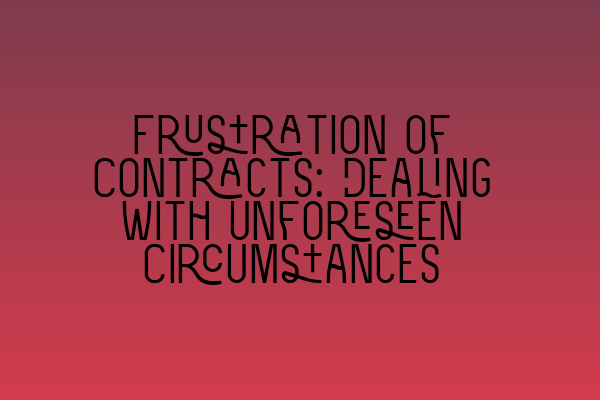Frustration of Contracts: Dealing with Unforeseen Circumstances
In the world of contract law, there are times when unforeseen circumstances arise that make it impossible for parties to fulfill their contractual obligations. These circumstances can range from natural disasters and pandemics to government regulations and economic changes. When such situations occur, frustration of contracts may come into play.
What is frustration of contracts, you may ask? It is a legal doctrine that allows parties to be released from their obligations under a contract when an unforeseen event occurs, rendering performance impossible or radically different from what was initially anticipated. This doctrine acts as a safety net, protecting parties from being held accountable for something beyond their control.
To understand frustration of contracts in more detail, let us delve into its key aspects and how it applies in different scenarios:
1. Unforeseen Circumstances: Frustration of contracts can only be invoked when events occur that were not reasonably foreseeable at the time the contract was entered into. These events must be beyond the control of the parties involved, such as the outbreak of a global pandemic or the imposition of unforeseen government regulations.
2. Impossibility of Performance: For the doctrine of frustration to be applicable, the unforeseen circumstances must make it impossible for the parties to perform their contractual obligations. This impossibility may consist of physical impossibility, such as the destruction of the subject matter of the contract, or it may be legal impossibility due to changes in regulations that make compliance impossible.
3. Radical Difference: Frustration can also be invoked when an unforeseen event radically changes the nature of the contract. In such cases, even if performance is not impossible, the parties may be excused from performing their obligations due to the significant alteration in the basis of the contract. This can occur when the purpose for which the contract was entered into becomes frustrated.
It is important to note that frustration of contracts is not a remedy that can be easily availed. Just because an unforeseen event occurs does not automatically release the parties from their obligations. The event must truly make performance impossible or radically different from what was originally anticipated. The burden of proof lies with the party seeking to rely on frustration, and the court will examine the circumstances surrounding the contract to determine whether frustration is a valid defence.
When a contract is frustrated, the parties are discharged from their future obligations, and any payments or benefits received prior to frustration are usually unaffected. However, the parties will not be entitled to claim damages for any loss suffered as a result of the frustration.
So, what are some practical examples of frustration of contracts? Let’s consider a few scenarios:
1. A music festival organizer contracts with a band to perform at their annual event. However, due to a sudden outbreak of severe weather conditions, the festival grounds are deemed unsafe, and the event cannot proceed. In this case, the contract may be frustrated as it is impossible for the band to perform at a canceled festival.
2. A company enters into a contract to purchase raw materials from a supplier located overseas. However, due to unforeseen government regulations, importation of the raw materials becomes prohibited. The contract may be frustrated as it is now legally impossible to fulfill the contract.
3. A landlord leases a commercial property to a tenant for the purpose of operating a restaurant. However, a government order is issued, closing all non-essential businesses due to a public health emergency. As a result, the tenant is unable to operate the restaurant, and the contract may be frustrated due to the radical difference in the basis of the contract.
In each of these scenarios, frustration of contracts may provide a legal remedy, allowing the parties to be released from their obligations under the contract.
If you find yourself facing a situation where frustration of contracts may be applicable, it is important to seek legal advice to understand your rights and options. An experienced contract law solicitor can help analyze the circumstances surrounding your contract and guide you through the process of invoking frustration if it is a valid defence in your case.
At SQE Contract Law, we specialize in contract law matters and have a team of knowledgeable solicitors ready to assist you. Whether you need advice on frustration of contracts or any other contract law issue, our expert team is here to provide comprehensive and tailored solutions to meet your needs.
If you are preparing for the SQE exams, we also offer preparation courses and practice materials to help you succeed. Check out our related articles for more information:
– SQE 1 Practice Exam Questions
– SQE 1 Practice Mocks FLK1 FLK2
– SQE 2 Preparation Courses
– SQE 1 Preparation Courses
– SRA SQE Exam Dates
In conclusion, frustration of contracts provides a legal avenue for parties to be released from their obligations when unforeseen circumstances make performance impossible or radically different. It serves as a safeguard, allowing parties to avoid unfair consequences when events outside their control impact their ability to fulfill contractual obligations. Seeking legal advice from a contract law solicitor is crucial to determine the applicability of frustration in your case and to navigate the complex legal landscape associated with this doctrine.
